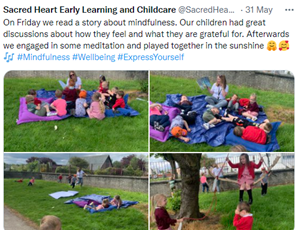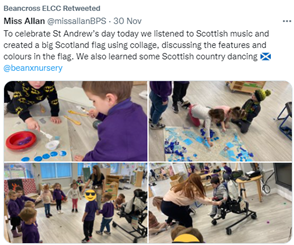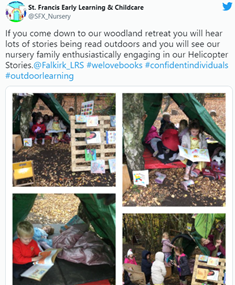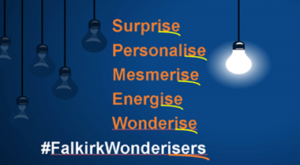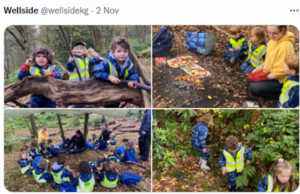Over the last while there has been a bit of a misconception over the ‘value’ or ‘place’ of ‘group times’ within settings. Some staff have even been heard to say: “we’re not allowed to have group times!”
Whilst it is true that we should all have moved away from the out-dated practice of sitting young children down in large groups to participate in an adult-led activity for long periods of time; this does not mean that children should never learn in groups. Carefully planned, playful, adult-led learning experiences are an important part of a balanced approach to quality play pedagogy in our ELC (and early primary) settings. One of the main differences when thinking about ‘group activities’ is that most group experiences now are interest based and optional as opposed to key worker groups.
Adult-led experiences in the ELC can be thought of as social “gatherings” where adults encourage children to come together to take part in a specific learning experience. Social gatherings greatly support social and emotional wellbeing; sense of belonging and cultural identity and the development of important life skills such as turn taking and communication. They also offer a wide range of different early level curricular learning opportunities too.
Whilst we should be mindful that to best support learning, the general rule of thumb is ‘the younger the child, the more time we should devote to child-initiated learning experiences’; adult-led learning experiences do still have a place.
With the completion of the 1140 hours agenda, our young children are spending more time in ELC settings than ever before. Add to that the disruption to social lives the Covid-19 pandemic has caused over the last two years and the importance of providing children with these fun, inspiring and motivating adult-led learning experiences through gatherings with their peers becomes an even more important consideration for early years practitioners.
It is important to remember that every planned adult-led learning experience we provide through gatherings must remain child-centred and developmentally appropriate for all of the children invited to take part in them! We must think about who we might encourage to come to each gathering and what knowledge, skills or learning dispositions we want the experience to support or challenge them to develop. Why will being invited to explore this through a gathering be more impactful than the child-initiated learning they would engage in through freely chosen play?
Having decided on the who and the what, we must then think about where and when the group of children will be most likely to achieve success. E.g. Will this group of children learn this best by gathering outdoors or indoors? When would a gathering be best timed to support children’s levels of wellbeing? When might their levels of engagement be higher? Will they still have enough time to wallow in child-initiated free play if we hold a gathering at this time?
Lastly, we must also consider the how. How will we ensure this adult-led experience/gathering is inspiring and motivating; really capturing the children’s attention and sparking their curiosity thus leading to deeper learning and better retention? Remember, all adult-led learning experiences should take place in short, sharp bursts and “be playful in nature; motivating children to be actively engaged in their learning through the practitioner’s imaginative use of materials, storylines, and hand-on activities which children enjoy e.g. songs, rhymes, games, puppets etc.” (Falkirk Council 2020 quoting DCSF 2009*)
A major part of our role as Falkirk Council ELC practitioners is to inspire young children, sparking their interest in the world around them and supporting them to be enthusiastic and motivated lifelong learners. Let’s continue to use high quality, developmentally appropriate and playful gatherings as one part of this amazing work.
In leading gatherings in our settings, we must always remain mindful of Ferre Laever’s theory that a child’s levels of wellbeing need to be high for them to engage effectively in learning experiences. If we try too hard to encourage, perhaps even cajoling, a child to sit down and stay at an adult-led gathering when they are not ready (either developmentally or emotionally) they will not learn effectively! Even worse, such practice may lead to children developing the negative view that adult-led learning experiences are uncomfortable, boring, confusing, or upsetting.
#wonderisers
